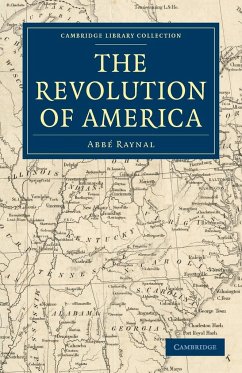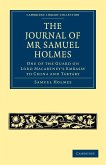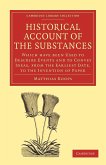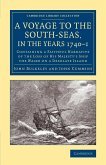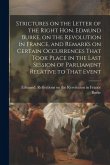- Broschiertes Buch
- Merkliste
- Auf die Merkliste
- Bewerten Bewerten
- Teilen
- Produkt teilen
- Produkterinnerung
- Produkterinnerung
Raynal's 1781 account of the American Revolution offers a solid explanation for its causes and intriguing speculation on the outcome.
Andere Kunden interessierten sich auch für
![The Journal of MR Samuel Holmes, Serjeant-Major of the Xith Light Dragoons, During His Attendance, as One of the Guard on Lord Macartney's Embassy to The Journal of MR Samuel Holmes, Serjeant-Major of the Xith Light Dragoons, During His Attendance, as One of the Guard on Lord Macartney's Embassy to]() Samuel HolmesThe Journal of MR Samuel Holmes, Serjeant-Major of the Xith Light Dragoons, During His Attendance, as One of the Guard on Lord Macartney's Embassy to37,99 €
Samuel HolmesThe Journal of MR Samuel Holmes, Serjeant-Major of the Xith Light Dragoons, During His Attendance, as One of the Guard on Lord Macartney's Embassy to37,99 €![Historical Account of the Substances Which Have Been Used to Describe Events, and to Convey Ideas, f Historical Account of the Substances Which Have Been Used to Describe Events, and to Convey Ideas, f]() Matthias KoopsHistorical Account of the Substances Which Have Been Used to Describe Events, and to Convey Ideas, f32,99 €
Matthias KoopsHistorical Account of the Substances Which Have Been Used to Describe Events, and to Convey Ideas, f32,99 €![A Voyage to South America A Voyage to South America]() Antonio De UlloaA Voyage to South America46,99 €
Antonio De UlloaA Voyage to South America46,99 €![A Voyage to South America - Volume 1 A Voyage to South America - Volume 1]() Antonio De UlloaA Voyage to South America - Volume 156,99 €
Antonio De UlloaA Voyage to South America - Volume 156,99 €![A Voyage to the South-Seas, in the Years 1740-1 A Voyage to the South-Seas, in the Years 1740-1]() John BulkeleyA Voyage to the South-Seas, in the Years 1740-131,99 €
John BulkeleyA Voyage to the South-Seas, in the Years 1740-131,99 €![Strictures on the Letter of the Right Hon. Edmund Burke, on the Revolution in France, and Remarks on Certain Occurrences That Took Place in the Last S Strictures on the Letter of the Right Hon. Edmund Burke, on the Revolution in France, and Remarks on Certain Occurrences That Took Place in the Last S]() Strictures on the Letter of the Right Hon. Edmund Burke, on the Revolution in France, and Remarks on Certain Occurrences That Took Place in the Last S16,99 €
Strictures on the Letter of the Right Hon. Edmund Burke, on the Revolution in France, and Remarks on Certain Occurrences That Took Place in the Last S16,99 €![The French Revolution and Historical Materialism The French Revolution and Historical Materialism]() Henry HellerThe French Revolution and Historical Materialism32,99 €
Henry HellerThe French Revolution and Historical Materialism32,99 €-
-
-
Raynal's 1781 account of the American Revolution offers a solid explanation for its causes and intriguing speculation on the outcome.
Hinweis: Dieser Artikel kann nur an eine deutsche Lieferadresse ausgeliefert werden.
Hinweis: Dieser Artikel kann nur an eine deutsche Lieferadresse ausgeliefert werden.
Produktdetails
- Produktdetails
- Verlag: Cambridge University Press
- Seitenzahl: 202
- Erscheinungstermin: 5. Mai 2011
- Englisch
- Abmessung: 216mm x 140mm x 12mm
- Gewicht: 292g
- ISBN-13: 9781108031905
- ISBN-10: 1108031900
- Artikelnr.: 33624427
- Herstellerkennzeichnung
- Libri GmbH
- Europaallee 1
- 36244 Bad Hersfeld
- gpsr@libri.de
- Verlag: Cambridge University Press
- Seitenzahl: 202
- Erscheinungstermin: 5. Mai 2011
- Englisch
- Abmessung: 216mm x 140mm x 12mm
- Gewicht: 292g
- ISBN-13: 9781108031905
- ISBN-10: 1108031900
- Artikelnr.: 33624427
- Herstellerkennzeichnung
- Libri GmbH
- Europaallee 1
- 36244 Bad Hersfeld
- gpsr@libri.de
Advertisement; 1. Distressed state of England in 1763; 2. England calls her
colonies to her aid; 3. England exacts from her colonies what she should
but have requested; 4. After having given way, England would be obeyed by
her colonies. Measures which they take to resist her; 5. The colonies were
in the right to separate themselves from their mother-country,
independently of all discontent; 6. What was the part which England should
have taken, when she saw the fermentation of her colonies; 7. England
determines to reduce her colonies by force; 8. The colonies break the ties
which united them to England, and declare themselves independent of her; 9.
Commencement of the war between the United States and England; 10. Why the
confederate provinces did not succeed in driving the English from the
continent of America; 11. France acknowledges the independence of the
United States. This measure occasions war between this crown and that of
England; 12. Spain, not having succeeded in reconciling England and France,
declares for the latter power; 13. What ought to be the politics of the
House of Bourbon, if victorious; 14. What idea should be formed of the
thirteen united provinces.
colonies to her aid; 3. England exacts from her colonies what she should
but have requested; 4. After having given way, England would be obeyed by
her colonies. Measures which they take to resist her; 5. The colonies were
in the right to separate themselves from their mother-country,
independently of all discontent; 6. What was the part which England should
have taken, when she saw the fermentation of her colonies; 7. England
determines to reduce her colonies by force; 8. The colonies break the ties
which united them to England, and declare themselves independent of her; 9.
Commencement of the war between the United States and England; 10. Why the
confederate provinces did not succeed in driving the English from the
continent of America; 11. France acknowledges the independence of the
United States. This measure occasions war between this crown and that of
England; 12. Spain, not having succeeded in reconciling England and France,
declares for the latter power; 13. What ought to be the politics of the
House of Bourbon, if victorious; 14. What idea should be formed of the
thirteen united provinces.
Advertisement; 1. Distressed state of England in 1763; 2. England calls her
colonies to her aid; 3. England exacts from her colonies what she should
but have requested; 4. After having given way, England would be obeyed by
her colonies. Measures which they take to resist her; 5. The colonies were
in the right to separate themselves from their mother-country,
independently of all discontent; 6. What was the part which England should
have taken, when she saw the fermentation of her colonies; 7. England
determines to reduce her colonies by force; 8. The colonies break the ties
which united them to England, and declare themselves independent of her; 9.
Commencement of the war between the United States and England; 10. Why the
confederate provinces did not succeed in driving the English from the
continent of America; 11. France acknowledges the independence of the
United States. This measure occasions war between this crown and that of
England; 12. Spain, not having succeeded in reconciling England and France,
declares for the latter power; 13. What ought to be the politics of the
House of Bourbon, if victorious; 14. What idea should be formed of the
thirteen united provinces.
colonies to her aid; 3. England exacts from her colonies what she should
but have requested; 4. After having given way, England would be obeyed by
her colonies. Measures which they take to resist her; 5. The colonies were
in the right to separate themselves from their mother-country,
independently of all discontent; 6. What was the part which England should
have taken, when she saw the fermentation of her colonies; 7. England
determines to reduce her colonies by force; 8. The colonies break the ties
which united them to England, and declare themselves independent of her; 9.
Commencement of the war between the United States and England; 10. Why the
confederate provinces did not succeed in driving the English from the
continent of America; 11. France acknowledges the independence of the
United States. This measure occasions war between this crown and that of
England; 12. Spain, not having succeeded in reconciling England and France,
declares for the latter power; 13. What ought to be the politics of the
House of Bourbon, if victorious; 14. What idea should be formed of the
thirteen united provinces.

